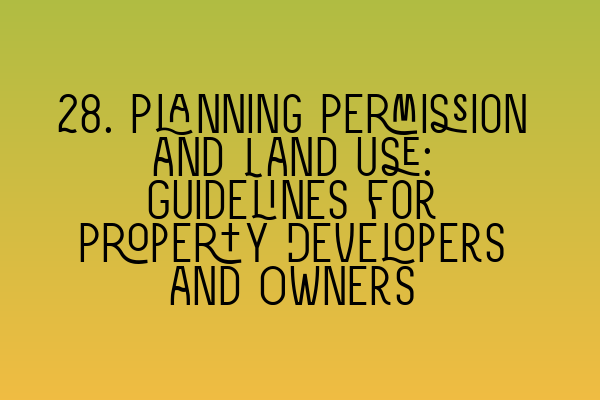Planning permission is a crucial aspect of property development and land use. As a property developer or owner, understanding the guidelines and regulations surrounding planning permission is essential to ensure a smooth and successful development process. In this blog post, we will explore the key considerations and steps involved in obtaining planning permission, as well as provide valuable insights and tips for property developers and owners.
Before we delve into the details, let’s briefly establish what planning permission is. Planning permission is a formal consent granted by the local planning authority, usually a local council or municipality, that allows a property owner or developer to carry out certain development or change the use of land or buildings. It ensures that any proposed development is in line with the relevant planning policies and safeguards the interests of the community.
Now, let’s jump into the guidelines and steps involved in obtaining planning permission:
1. Research and Understand Local Planning Policies:
One of the first steps in pursuing planning permission is researching and understanding the local planning policies that govern the area in which your property is situated. Each local authority will have its own set of policies and guidelines that outline what is acceptable in terms of development and land use. Familiarize yourself with these policies to ensure that your proposed development aligns with the local authority’s objectives. You can usually find this information on the local council’s website or by contacting the planning department directly.
2. Identify the Type of Planning Permission Required:
There are various types of planning permission that you may require depending on the nature of your development. These include outline planning permission, detailed planning permission, change of use permission, listed building consent, and others. Determine which type of permission you need by consulting with a professional or referring to the local planning authority’s website or guidelines.
3. Engage with Relevant Professionals:
Seeking professional advice and assistance in the planning permission process can be invaluable. Solicitors, architects, town planners, and surveyors have extensive knowledge and expertise in navigating the complexities of planning permission. They can help you understand the local planning policies, prepare the necessary documentation, and provide expert guidance throughout the application process. At SQE Property Law & Land Law, we offer comprehensive legal services for property developers and owners, including assistance with planning permission applications. Contact us today to learn more.
4. Prepare a Robust Planning Application:
A well-prepared planning application is crucial for success. It should include detailed information about the proposed development, such as architectural plans, site layouts, environmental impact assessments, and any other relevant supporting documentation. Ensure that your application addresses any potential concerns or objections that may be raised by the local authority or the community. This includes considerations such as the impact on the local infrastructure, environment, and surrounding properties.
5. Engage in Community Consultation:
Engaging with the local community and addressing any concerns they may have can significantly improve the chances of obtaining planning permission. Consider hosting public consultations, where you can present your plans and gather feedback. Taking into account the community’s input and addressing their concerns can help build positive relationships and demonstrate that your development is considerate of local needs and interests.
6. Submit the Planning Application:
Once your planning application is prepared and complete, submit it to the local planning authority along with the required fees. Ensure that your application is submitted within the specified timeframe and that all the necessary documentation is included. Keep track of the progress of your application to promptly address any queries or additional information requested by the local authority.
7. Monitor the Planning Process:
After submitting your application, the local authority will review it and make a decision. This process may take several weeks or even months, depending on the complexity of your development and the backlog of applications at the planning department. Stay in touch with the planning officer assigned to your case to keep updated on the progress and address any issues that may arise.
8. Appeal if Necessary:
If your planning application is rejected or if you are dissatisfied with the conditions attached to the permission granted, you have the right to appeal the decision. The appeal process varies depending on the jurisdiction, but it usually involves submitting an appeal form and supporting documents to an independent planning inspectorate. Seek legal advice from a solicitor to guide you through the appeals process and improve your chances of success.
In conclusion, obtaining planning permission is a critical step in property development and land use. By understanding the guidelines and regulations surrounding planning permission, engaging with professionals, and preparing a robust application, you can increase your chances of obtaining the necessary consent for your development. At SQE Property Law & Land Law, our expert solicitors can provide comprehensive advice and assistance throughout the planning permission process. Contact us today to discuss your property development needs and benefit from our expertise.
Related Articles:
– SQE 1 Practice Exam Questions
– SQE 1 Practice Mocks FLK1 FLK2
– SQE 2 Preparation Courses
– SQE 1 Preparation Courses
– SRA SQE Exam Dates
